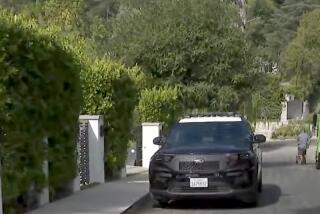What to Do If You Become a Victim
- Share via
Suppose the worst happens, and the bad guys get the jump on you. Suddenly you are transformed from “citizen” to “victim.” What now?
BURGLARY
You step out of your car, walk to your front door and realize that somebody has broken into your home. Your instinct may be to rush in. Ignore it.
Walk away from your home and into a neighbor’s house or a phone booth. Call the police. Wait where you are until they arrive.
If you are not aware that you have been burgled, and notice things missing as you walk around your home, go straight to the phone, call the police, and do not touch anything in the house.
If you feel uncomfortable staying in the house after the police have gone, sleep over with a friend. Either way, be sure your house is secure and any damaged locks replaced.
The next day, call your insurance company and report the loss. Be sure to give the police and the company as complete a list of stolen articles as you can.
After that, the only thing you can do is allow the police to do their work.
ASSAULT
If someone enters your home and assaults you, or you are mugged on the street, there is probably little you can do to resist.
“Do not be a hero,” advises Judith Rowland of the Crime Victims Legal Clinic. “Do what they ask and try to remember everything.”
Call the police after the assailant leaves. Don’t wait. The assailant may still be in the area, and police sometimes catch muggers before they can go far.
Victims of sexual assaults normally feel a great need to cleanse themselves as soon as possible. As distasteful as it seems, do not wash after the attack--the evidence left on your body may convict the criminal. Call the police immediately.
Then call a close friend or relative who can give moral support.
GET SOME HELP
The days and weeks following an attack or a home invasion can bring on emotional reactions you may not expect.
According to psychologist and victim counselor Dr. Charles Nelson, physical symptoms may include shortness of breath, racing heartbeat, dizziness and even a lack of coordination. Some emotional symptoms may include insomnia, hyperactivity, guilt, a feeling of dread and an inability to concentrate.
There are programs established to help individuals deal with the emotional and financial impact of a crime.
The San Diego County district attorney’s office operates a victim witness assistance program. The staff will act as your advocate as you negotiate the aftermath of crime.
They provide a range of services, from arranging for food and rent vouchers for needy victims to accompanying you to court. Victims of violent crime and sexual assault can expect a staff member to help them from the early hours after the crime until the case is over.
The office will also help victims obtain restitution from the state’s Victims of Crime Restitution Fund. This fund will help pay for those expenses not covered by other sources such as insurance. For instance, if you need counseling, the office will refer you to therapists and help you obtain money for treatment from the state fund.
According to Marianne Gallagher, this office has staff in all county courthouses. There is no fee for the services.
To reach victim witness assistance call 531-4041. To reach Gallagher directly, dial 531-2772.
VICTIM AID
Several other nonprofit organizations help victims.
Escondido Youth Encounter (EYE), 747-6281
This group operates an assistance program geared toward victims of violent crime. EYE offers safe shelter, support groups and follow-up. EYE is part of the Sexual Assault Response Team dispatched from Pomerado Hospital in cases of rape or sexual abuse.
The Oceanside Police Department Victim Aid Program, 966-4985
Oceanside Police work primarily with victims of violent crime. The counselors will refer victims to psychologists who can give counseling therapy and offer such support services as transportation to and from court, help in filling out police reports and explain how the justice system operates. “We stay with the victim throughout the life of the crime,” said staff member Betsy Ford.
Crime Victims Legal Clinic 232-3300 in San Diego or 753-2233 in Encinitas
This organization was started in 1984 by Judith Rowland, a former prosecutor. The clinic focuses on working with victims of violence and offers a range of advocacy services from legal advice to counseling.
Crime Victims Fund, 238-1988
Other organizations often refer people who have lost property to the Crime Victims Fund. The fund will screen applicants, and, based on need, help with rents, food, storage fees and other forms of temporary help within 24 hours of the crime.
However, according to Gini Araiza, the fund is now critically short on cash.


